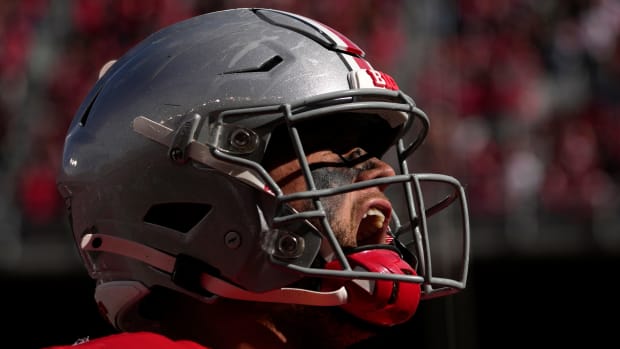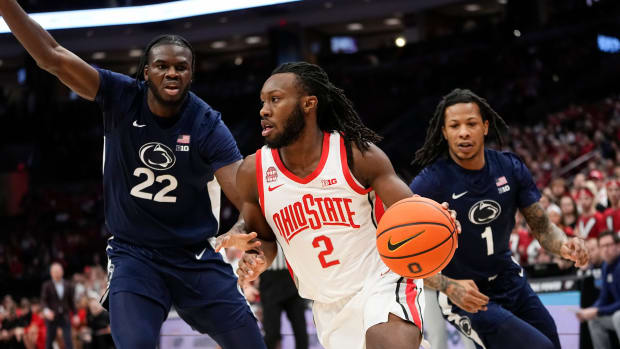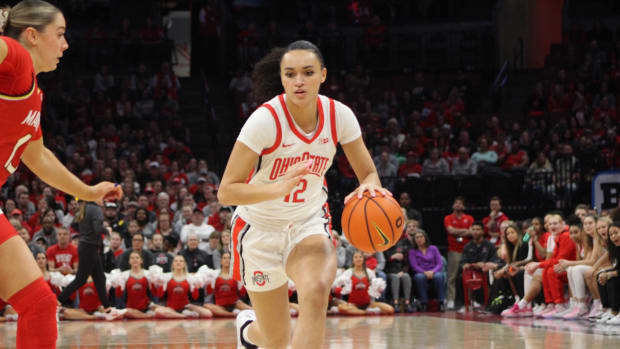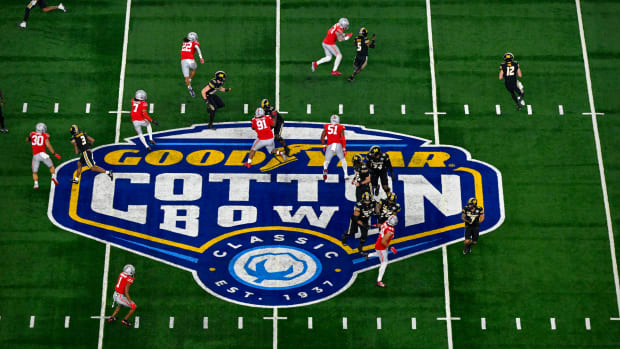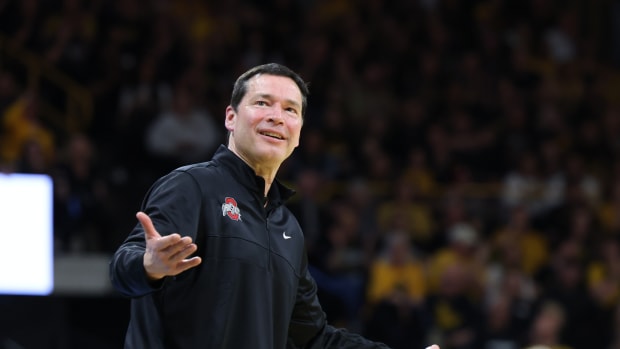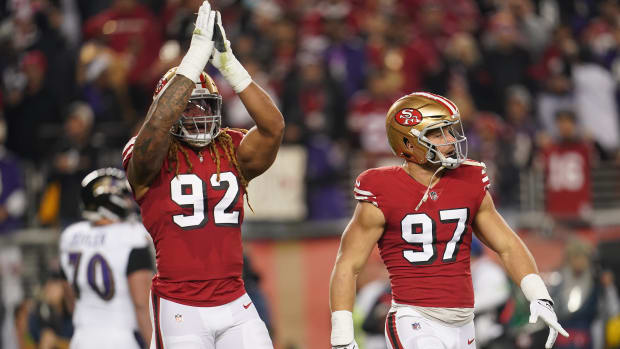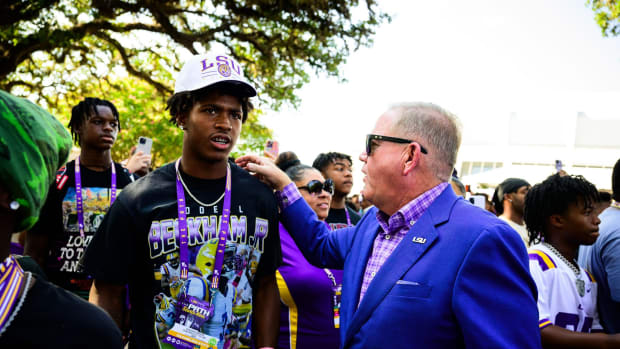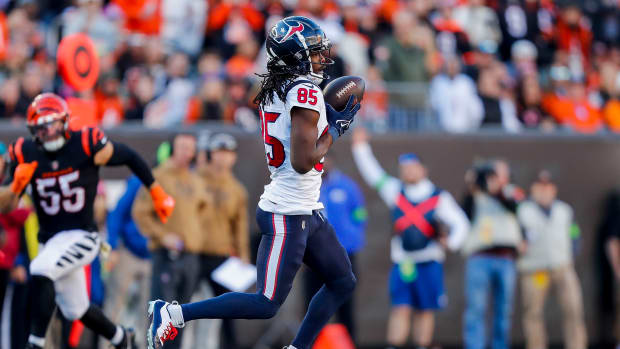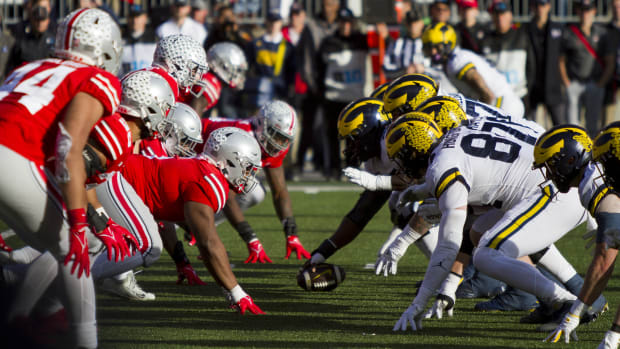'America, Realigned' Roundtable: How Ohio State, Big Ten Schools Would Be Affected by Hypothetical New College Landscape
Earlier this week, Sports Illustrated's Pat Forde reexamined and reconfigured the college athletics landscape in his "America, Realigned" project. It's been 10 years since the last major conference realignment, and in light of the lasting impact CoVID-19 is having on collegiate athletics, Forde decided to have some fun by hypothetically realigning the conferences.
The Ohio State Buckeyes were placed in the Great Mideast Conference during Forde's exercise. Some of the current Big Ten schools were grouped in the same league, but many of the schools Ohio State is used to playing are in other conferences.
At its core, Forde created ten leagues, each with 12 schools and each arranged to maximize proximity (geographically friendly) and reduce travel demands and costs. There are no more than eight Power 5 programs in a single new conference, and no fewer than four. And there are no independents.
BuckeyesNow.com participated in a roundtable discussion with a few other Big Ten publishers this week to address how the new alignment would affect each school.
This is part one of a two-part series, sharing our discussion.
With the new, hypothetical realignment set up by Pat Forde, how would the program you cover potentially fare in its new conference?
Brendan Gulick (BuckeyesNow.com): From a football perspective, there can’t be many other schools that feel their schedules would get this much easier. Ohio State’s non-conference opponent is Penn State, which is always a good matchup. They would keep their rivalry with Michigan, which is obviously important. Beyond Michigan State, the Buckeyes are quite unlikely to have any issues with the rest of the teams in the conference. Purdue and Indiana occasionally play the Buckeyes tough, but not frequently. Cincinnati has had some good teams the last few years, but Ohio State had little trouble with them last year. Ohio State might be favored by at least 30 points against the rest of the league.
From a basketball standpoint, Ohio State would likely be one of the better teams in the conference. But Michigan, Michigan State, Indiana, Purdue and Cincinnati all have outstanding programs.
Jake Kocorowski (AllBadgers.com): I honestly feel Wisconsin would have a great chance every year of making the revised College Football Playoff if this hypothetical realignment would come to be. I would consider the Badgers the favorites in the Great Midwest Conference, along with two other Big Ten West programs in Iowa and Minnesota. The other Power Five teams in the league -- Iowa State, Nebraska, Kansas State, Missouri, Kansas -- could have opportunities to make a splash down the line, with maybe the Cyclones and Wildcats being the most ready to do so. Defending FCS champion North Dakota State would be tough in the Fargodome, but still feel like Paul Chryst’s program would be primed for annual success.
Mark Wogenrich (AllPennState.com): From a playoff perspective, Penn State loves the Yankee Conference. The Lions are 34-5 against league members since 2000 and have lifetime winning records against all 11 teams (though that 19-17-2 mark against Navy is dicey). No more visits to East Lansing or potential hot spots like Minnesota and no more banging heads in the Big Ten East against Ohio State. Penn State basically becomes the ACC version of Clemson overnight.
Matthew Stevens (IlliniNow.com): In football, Illinois would fare about the same. In a bad year, the Illini would struggle to defeat any of the name brand programs (Notre Dame, Tennessee, West Virginia, Kentucky, Vanderbilt and Northwestern) but even in horrifying season, the Illini have still fared decent to pretty well against the current Mid-American Conference, Sun Belt, Conference USA directional school opponents moving into this league such as Northern Illinois, Western Kentucky and Middle Tennessee State. In a good year, the one pipe dream victory for the Illini would be Notre Dame, who Illinois has never beaten in school history, but with the way Jeremy Pruitt is recruiting at Tennessee, the Volunteers could suddenly be a problem. Bad year: 2-3 wins. Good year: 8-9 wins and a New Year’s Day bowl bid.
In basketball, Illinois would handle this just fine from a competitive standpoint. When Illinois is recruiting at a level it should be and has been recently under Brad Underwood, the two Kentucky powers (UK and Louisville) are the only scary teams standing in the way of league supremacy. West Virginia would cause problems every now and again.
What would you change about the conference, if anything?
Brendan: If I’m a fan that wants more guaranteed victories, I don’t change anything. This league is significantly less competitive than the Big Ten. And depending on where I live around the state, it might be easier for me to see the Buckeyes more often as they make short road trips to many other Ohio-based schools.
Jake: I hear Brendan’s argument. Wisconsin would be in a great spot if these teams were locked. If you wanted more competitiveness or more of the Big Ten feel in the Great Midwest Conference, however, having Illinois or Northwestern, or even potentially Michigan or Michigan State, would make it interesting (though according to Forde’s parameters, there can be only eight Power Five schools per conference).
Even with some of the MAC schools, perhaps swap out one of the directional Michigan programs for Northern Illinois, whose head coach (Thomas Hammock) was an assistant at Wisconsin.
Mark: Stretch the boundaries to add a few more Power 5 schools. Perhaps Virginia, Virginia Tech or West Virginia. Massachusetts and Connecticut are relatively new to FBS-level football. What if they decide the investment isn’t worth it? There seems to be too much imbalance from top to bottom.
Matthew: Change everything. Better yet, don’t do this. Scrap the whole thing. This is terrible for Illinois. Suddenly, the Fighting Illini are in a league with no regional rival (and no, Northwestern and Northern Illinois don’t matter to this fan base as much as Indiana, Iowa, Wisconsin and Michigan do), no program identity and trying to figure out how to get motivated for conference games against schools in West Virginia, Tennessee, and Kentucky. Nothing about that says Midwest or defines how Illinois natives see themselves in the national landscape. This is Syracuse entering the Atlantic Coast Conference with no history, no rivals and little to no regional logic for the move.
